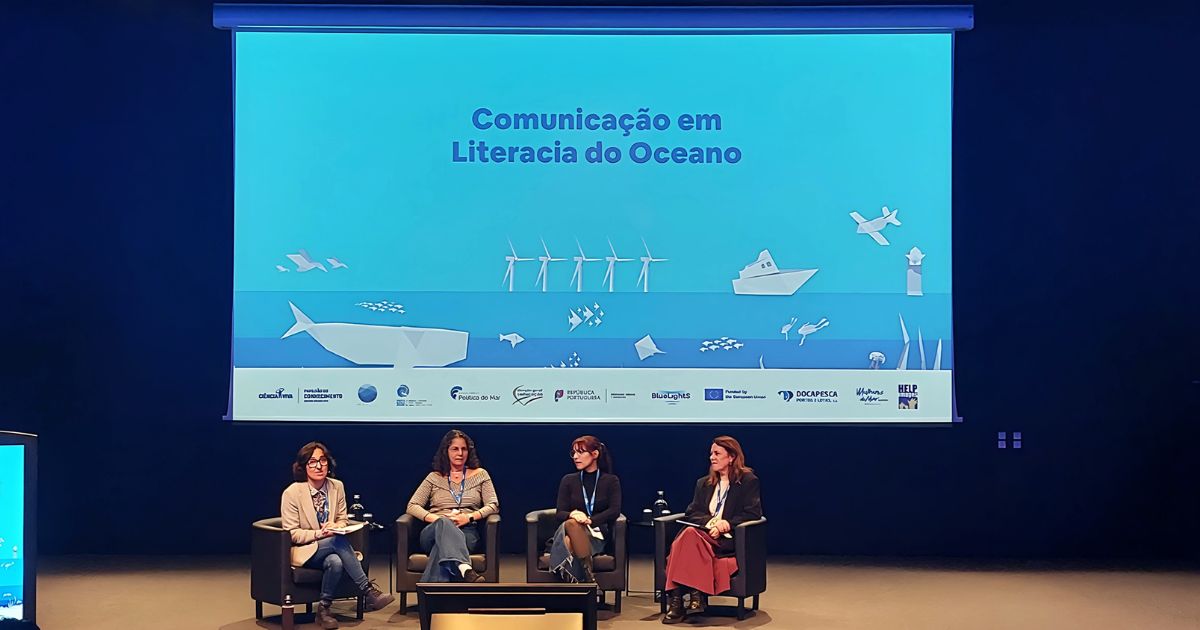MARE contributes to the national debate on ocean literacy at the 2nd National Conference
The 2nd National Ocean Literacy Conference brought together researchers, teachers, young people, public institutions, and civil society organizations on November 7 and 8 at the Pavilion of Knowledge to discuss how Portugal relates to the sea. MARE participated in several sessions of the program, highlighting educational, cultural, and social approaches that reinforce the importance of involving different audiences in ocean protection.
Organized by Ciência Viva and the National Committee for the Decade of the Ocean (CNDO), with institutional support from the General Directorate for Education (DGE) and the General Directorate for Maritime Policy (DGPM), the conference discussed Ocean Literacy in the contexts of education, society, communication, citizenship and activism, the sustainable blue economy, traditional knowledge and Portuguese-speaking communities, and the voice of young people.
MARE has played an important role in the evolution of Ocean Literacy in Portugal and in consolidating this conference as a meeting place for science, education, and society. In this context, Zara Teixeira, a researcher at MARE/ARNET at the University of Évora, was a member of the conference program committee for the first and second editions of this event, moderating the session dedicated to communication and reinforcing MARE's active presence in the strategic orientation of this national initiative.
The researcher also had the opportunity to present the work carried out in the salt pans of Figueira da Foz, in the session dedicated to society. This project has brought the community closer to a natural heritage that is often invisible. Zara Teixeira recalled that “there was a very large disconnect between the traditional salt pans of Figueira da Foz and the city itself” and explained how the project sought to reduce this distance through collaborative activities with local associations, artists, and community groups.
In the session dedicated to communication, Claudia Erber, a researcher at MARE at the Higher Institute of Applied Psychology (ISPA), shared the journey of the podcast and videocast Olhos no Mar (Eyes on the Sea), which brings together testimonies from women working in marine conservation, particularly marine mammal observers. The project, the researcher described, “has become a source of knowledge about these very unique stories,” bringing to the public the real experiences of those who live the sea on a daily basis.
The perspective of young people took center stage with the intervention of Joana Camacho, a young ambassador for MARE - Madeira at ARDITI/University of Madeira. Her message focused on the importance of communicating hope and motivation. As she stated, “I think it is very important to raise awareness, but also to show what can still be saved,” arguing that positive images and opportunities for participation have a greater impact on mobilizing new generations.
In the session dedicated to education, Diana Boaventura, MARE/ARNET researcher at the Faculty of Sciences of the University of Lisbon (CIÊNCIAS ULisboa) and professor at the João de Deus Higher School of Education, presented the work developed to integrate ocean literacy into initial teacher training through practical and collaborative activities in an academic context. Miguel Pessanha Pais, a MARE collaborator and member of the MARDIVE Association, highlighted the evolution of the KidsDive program, which now uses virtual reality to reach schools across the country. The researcher pointed out that “sometimes it is not possible to take people with reduced mobility to the sea, but it is possible to bring the sea to these people through virtual reality,” emphasizing the potential of immersive technologies to promote inclusion.
The conference also included a reflection on traditional knowledge in Portuguese-speaking countries. Fernando Momade, a PhD student at MARE at Universidade Nova de Lisboa, brought the experience of Mozambique, where knowledge passed down through generations now faces the impacts of climate change. As he pointed out, “fishing is not only an economic activity, it is also a cultural identity,” which points to the importance of integrating these perspectives into ocean literacy strategies.
Over two days, MARE/ARNET's contributions highlighted the diversity of approaches that promote ocean literacy in Portugal. From communication to territory, from education to culture, the presentations reinforced the idea that learning about the ocean is a collective process involving science, communities, and creativity.
Written by Vera Sequeira, Joana Cardoso, and Zara Teixeira
